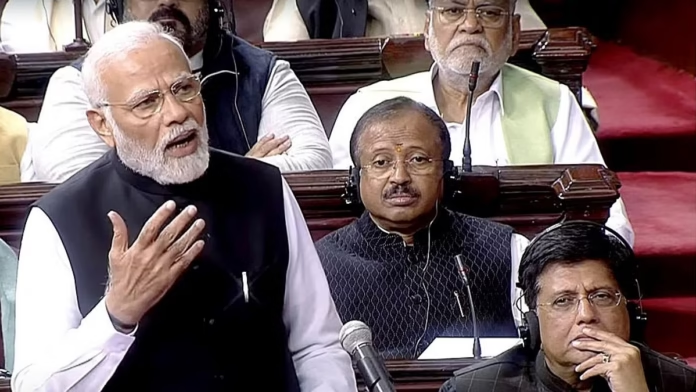Prim Minister Narendra Modi addressed the Lok Sabha on Tuesday, strongly defending the government against claims of U.S. intervention in the Operation Sindoor ceasefire.
He declared: “No leader of any country asked India to stop Operation Sindoor.”
Modi framed the strikes as proof of India’s resolve and military capability. He also criticised the Opposition for failing to stand with the armed forces during a time of crisis.
Responding to a two-day debate on the Pahalgam terror attack and the subsequent Indian strikes, Modi underscored that India had global backing for its actions.
“No country in the world has stopped India from any action in its defence against terrorism. Only three countries spoke in favour of Pakistan at the U.N.” he said.
What stood out was Modi’s pointed critique of the Congress party:
“India got support from the entire world, but it is unfortunate that the Congress did not support the valour of our soldiers. Congress leaders targeted me for political gains, but their frivolous statements ended up discouraging our brave soldiers,” he said.
Strategic Messaging: Calling Pakistan’s Nuclear Bluff
Modi presented Operation Sindoor not merely as retaliation for the April 22 Pahalgam attack, but as a strategic reset in India’s posture. He claimed that India had exposed Pakistan’s nuclear threats as empty:
“We will not bow down to nuclear blackmail,” he said, adding that the strikes demonstrated that terror sponsors would pay “a huge price for any misadventure.”
In his speech, Modi detailed that Indian drones and missiles “destroyed terror sites deep inside Pakistan within 22 minutes,” showcasing what he described as the strength of “self-reliant India.”
A Clash Between Domestic Politics and National Security
The Prime Minister’s remarks were also a sharp political rebuke to the Opposition. He accused Congress of “becoming spokespersons of Pakistani propaganda” and “giving a clean chit to Pakistan.” This framing reflects the government’s attempt to turn a national security crisis into a referendum on political loyalty—an approach that has historically resonated with Modi’s base.
The Opposition, meanwhile, has raised questions about the timing of the strikes and why U.S. President Donald Trump publicly announced a ceasefire. Modi countered this by revealing a late-night exchange with U.S. Vice-President JD Vance:
“U.S. Vice-President (JD Vance) tried to reach out to me three to four times, but I was busy with meetings with the armed forces. When I returned the call, he warned me of a big attack from Pakistan. I told him that if Pakistan attacks India our attack would be much bigger as we will respond to bullets with cannons,” he said.
Geopolitical Implications
Modi’s address underscored a new phase in India’s foreign policy. Military assertiveness, technological self-reliance, and a hardline stance against Pakistan are now converging. Yet, it also revealed a deeply polarized domestic political landscape. National security has become both a shield and a weapon in India’s political discourse.
Whether this speech will build consensus or deepen divides remains uncertain. But its international message was clear: India wants the world to see it as decisive and unrestrained in defending itself.
Still, the question persists: Why is Donald Trump claiming credit for stopping the war? Modi’s remarks directly counter this narrative, insisting that no world leader asked India to halt Operation Sindoor. His version points to quiet coordination, not coercion—reflecting India’s growing confidence in managing its own strategic decisions, even amid global scrutiny.








